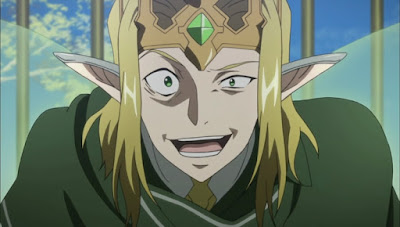This was quite a strong season overall; there were few, if any shows
I'd actually call weak, and many pleasant surprises. So let's get to
it, shall we?
Concrete
Revolutio
I, like most other watchers, don't know exactly what to make of this
show. It's quirky and convoluted to a fault, though that's arguable
part of its charm. My main problem would be the show's message, or
what I perceive as the show's message: there is no such thing
as true justice, as even supposed evildoers have their reasons for
doing things. That's way too simple a message for a show as
ambitious as this, and the characters all seem like idiots for
constantly failing to grasp this idea. At least it's a colorful,
energetic diversion.
Valkyrie
Drive: Mermaid
Having seen a number of Hiraku Kaneko-directed shows, I thought he
was good only with the fanservice-related aspects of anime and
nothing else. While no doubt a master at gathering well-endowed
girls onscreen, their personalities tended to awaken my strangling
instincts. Valkyrie Drive: Mermaid forces me to rethink my
opinion of this director; these characters are actually endearing!
Many have strong motivations, there's a distinct undercurrent of
loss and homesickness throughout, and as a result the show is
surprisingly watchable. Oh, bare nipples are still shoved in our
faces at every opportunity, which will no doubt turn people off. But
this is the first time I've watched a Kaneko show and honestly felt
that the characters represented more than their respective cup sizes.
Well done.
Gundam:
Iron-Blooded Orphans
A solid show overall, but one I do have reservations about. There'll
be a write-up on this shortly, so stay tuned for that. Let me assure
you right now that it is a major step forward after Gundam:
Reconguista in G.
Ushio &
Tora
Pretty similar to the first cour, only this one focused solidly on
advancing the plot rather than monster-of-the-week adventures. So, a
slight improvement, even.
Osomatsu-san
Read my article on the subject for more detail, but I'll say here
that it's a great show. Probably the unexpected comedy hit of the
year, considering its modest, obscure origins.
Kagewani
I'd hinted previously that I didn't like this show, but I certainly
don't hate it. While certainly failing at horror, it more or less
woks as a cheesy, shorter version of those Syfy channel original
movies. Okay, not exactly a glowing recommendation, but there's a
respectable audience for such things.
Kowabon
Unfortunately I can't give a final impression on this show because
English subtitles have been almost impossible to come by. Though
succeeding at actual horror unlike Kagewani, it can't boast a
definitive climax like the other show. How can I say Kowabon
is a truly good show if it may drop the ball at the end? Well, FI
loved the seven episodes we got so far, and hope to complete it
someday soon.
Attack on
Titan Junior High
A fun little show if you approach it with the right attitude. Unlike
some other recent comedies, this one really can't be called creative,
but its single joke worked pretty well over the show's run. And of
course the characters were fun to watch; I was actually surprised how
well they lent themselves to comedy. Of course, newcomers to the
franchise need not apply.
The Perfect
Insider: Everything Becomes F
Finally, a good mystery show! One that doesn't faceplant at
the end, or talk down to the audience, or put on airs of pretention
to hide its bullshit! Some critics disagree with me on these points,
of course,. But after the trainwreck ending of Rokka no Yuusha
and the fedora-wearing middle finger of Ranpo Kitan: Game of
Laplace, it feels great to enjoy a mystery from beginning to
closing.
Owarimonogatari
I get the feeling I tend to turn a blind eye to this show's faults,
given how intimate my familiarity and love for the whole franchise
is. But this show had some particularly great moments, mostly
involving Oikura, Shinobu, and of course Ougi (one of my favorite
villains ever). Sure, I wished some parts wre as visually
interesting or well-animated as previous installments. But that
doesn't really dampen a good story much, one that I can't wait to see
more of.
One Punch Man
Do I even need to describe how much fun this show is? Just watch it
now, or you'll soon be left behind by the rest of fandom.
And that does it for the most recent season! Next one seems to have
fewer shows I'm familiar with through franchises and/or creators, so
we'll see how that turns out!


























